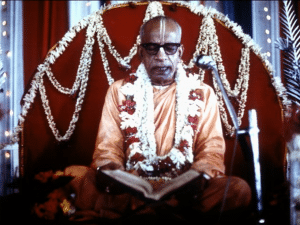Srila Prabhupada Organisned GBC
Yet, for all of this vitality and excitement and adventurism and dynamic vibration around Prabhupada, there was an ineffable air or shell of softness. You felt it, when you got within a foot or two of Prabhupada's actual physical body, that it was cooler and softer. And there was some kind of a soft cushion there. I know that probably others who have massaged him and served him have felt that also. It was like entering an air-conditioned room. It was totally calm around his body, like a halo. One of the other qualifications of a saint is silence. Sometimes Prabhupada would, I swear, talk to me and not open his mouth. [Laughs.] I'd look up and he'd just be looking at me, and I would have heard a full conversation in my head. Sometimes when I was writing letters this would happen. I always had the feeling that something else was guiding my hand when I was typing these letters for Prabhupada. I could hear his words ringing in my ears. I could type with my eyes closed and everything would be all right. They came out just perfectly. Someone would ask a strange question or an esoteric question from some scripture that I had no clue about. I just let my mind go, and Prabhupada would throw the answer in there. I would always check it with him and run it through for him, and he'd sign it. [Laughs.] Prabhupada was so expert that he expanded himself. In fact, the greatest area of his expertise was his ability to manage. It has to be seen in context what Prabhupada did. From a single individual with absolutely no resources, and just his words, he was able to build a worldwide society of people, a global society, long before what we are calling the Age of Globalization, which is right now. I mean, we couldn't find videotapes or cassette tapes or even the old cassette cartridges anywhere else in the world besides America. We used to wait at the post office in Bombay to make a long distance call, if we were lucky. Forget about communication, forget about any of this, and Prabhupada had a worldwide organization built up in three or four years. How he managed this should be studied. But I was fortunate to be there at the most exciting time, when all of this really kind of hit the fan, and Prabhupada came up with this idea. He called me, and he was becoming overburdened with his management. He was complaining about not having time to translate, because we had no books during these early days. We finally got Bhagavad-gita years after we met Prabhupada. We had nothing to distribute. So Prabhupada had a two-fold task. He had to keep us all organized somehow, plus he had to provide us with the books. Imagine! So in order to provide himself with the time to translate he came up with this idea of a GBC, Governing Body Commission. He called me in early one morning. And this idea came as if he had been thinking about it for a long time. I never saw him sleep, so I'm sure that he was working on his managerial problems during that time. And he said, "Shyamasundar, take dictation. Henceforth, I want to govern the Society in this way. And you write it down, and you send copies of this out to the various leaders whom I shall appoint." His idea was, at that time and forevermore, to divide the world into twelve zones and be managed by a householder or someone with business experience. Tamal Krishna Goswami was the one exception at the time, because he had just taken sannyas very recently, and Prabhupada allowed him to be GBC for India because he was the only qualified man at the time. There were no Indian devotees who had yet come up. So he wanted householders, managers, and businessmen to run his Society and manage all the business affairs. And sannyasis should be free and should roam from zone to zone, wherever their feet would take them, and preach, period. Now I think those two functions have gotten intermixed and diluted. I know Prabhupada's original intent, and it was not to change. That was it. And he even sent a letter to the twelve GBC men. He said, "But this shall be a democracy. And if there are matters that affect the whole society, then you shall all vote. And because we are a democracy, the unanimous vote will hold. And if there's a deadlock, I will throw the remaining vote, but only if there's a grievous error." Somebody must have a copy of that. The original letter must be in the VedaBase.
